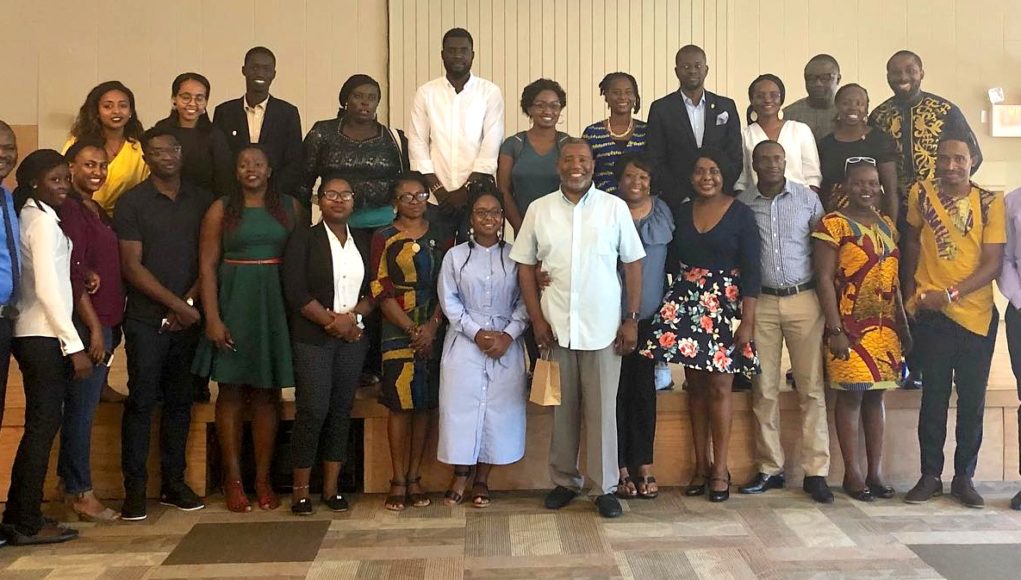“I didn’t realize that being among these African leaders how I would feel so empowered. For me, they represent world history but also the future. We felt connected even though we hadn’t met before,” says Dr. Rev. Alex Gee. “There was something extremely powerful about people across the African diaspora [coming together]. We need to have more gatherings like this. It really moved me.”
On July 9, Dr. Gee and his team at Nehemiah Center for Urban Leadership Development hosted the Mandela Washington Fellows of the African Studies Program at UW-Madison.
The Mandela Washington Fellowship (MWF) for Young African Leaders is the flagship program of the Young African Leaders Initiative (YALI). The program empowers young people through academic coursework, leadership training, and networking. All told, the 2019 MWF brings 700 leaders from sub-Saharan Africa to American universities for academic discussion, leadership training, and community engagement.
“Thousands of people applied to be part of this emerging leaders program from all over the continent. A few hundred are selected,” Gee tells Madison365. “They are dispersed across the U.S. – there are some in Chicago, New York, Atlanta. But there’s this excellent group that is here in Madison.
“The folks that I met in Madison are from 18 different countries ranging from Ghana to Liberia to South Sudan to Cameroon to Kenya to Uganda to Niger to South Africa and a whole bunch more,” he adds. “Even when African-American people talk about Africa, some don’t realize that it’s not just one group – it’s so many different groups.”
The University of Wisconsin-Madison is among 27 universities in the United States selected as hosts for the Mandela Washington Fellowship for the summer of 2019.
“They are physicians, people working for secretaries of health, one woman runs a foundation for differently abled people. They are amazing civic, educational and national leaders,” Gee says. “They were introduced to me as a very astute and eclectic group; some of whom will become the presidents of their respective countries.”
Dr. Gee, the founder of The Nehemiah Center for Urban Leadership Development, a non-profit organization that inspires, develops and mobilizes emerging African American leaders to become partners in revitalizing and transforming our community, says he enjoyed telling the young African leaders about the work that he does here in Madison while also listening to the lives and experiences of the young African scholars.
“I really wanted them to spend time with African Americans so what I loved about this space [at Nehemiah] was that it was a chance for Africans and African Americans to just talk – how we see each other; how we need to work together in this world,” Gee says. “It’s not that often where Africans and African Americans get to talk about Africa, the slave trade, and America with no one else in the room.
“It was absolutely powerful and riveting,” Gee continues. “I talked about my appreciation of Africa, what I learned and didn’t learn growing up. Growing up in a community like Madison, I was really ashamed of Africa.”
Some scholars told Gee that they don’t get up every day in Africa thinking, “Hey, I’m black.” It’s a weird concept for Gee, who hosts a podcast show titled “Black Like Me.”
“They’re not denying their blackness, but one young man said, ‘I’m from Kenya. I’m not thinking that I’m black. That’s just my worldview.’ Just like fish don’t think about water and birds don’t think about air, when it’s just all around you, you don’t think about it,” Gee says. “It blew my mind that he’s so immersed in Kenyan culture that being black is like breathing and you don’t have to think about it. It blew me away.”
Gee, who is also the lead pastor of Fountain of Life Covenant Church, a multiracial, multigenerational and multi-class congregation on Madison’s south side, says that the young African scholars were thrilled to find out that he was also a pastor at a local church.
“That intrigued them more than our U.S. black history course, more than our building project – the fact that I’m a pastor and I care about our community really intrigued them,” Gee says. “Which is interesting because in Madison, I think sometimes we hiccup – can we work with faith leaders in the public square? Is that a no-no? In the worldview of the African diaspora, we’re not that compartmentalized. It was refreshing to see how much they loved that as a faith leader, I am involved in issues of justice in my community.”
At the end of the busy time spent with young African leaders, Gee realized that he didn’t even get a chance to go through his Nehemiah slides.
“I had a whole slide presentation I was planning on going through with them, but we just didn’t have time because of the intriguing conversations we were having,” Gee laughs. “They were late going to meet the mayor because they were still asking me questions.”
Gee is hopeful that they can meet up again.
“We were so stirred by this meeting that we are hoping the program will let us throw a reception next week so that African-American leaders, influencers, non-profit leaders, pastors and more can come to a reception that we are trying to organize just to interact with these people,” Gee says. “Ultimately, we want to build a connection between them and us here in Madison. I want to stay connected to as many of these leaders as possible because we have never had a connection with 18 different African countries and black leaders in Madison, Wisconsin.”










